



This blog post will cover breast cancer symptoms and risk factors for both men and women. We’ll also explore the relationship between breast cancer and metallic taste, known as Dysgeusia, and how to manage it. Finally, we’ll share some tips on improving your quality of life as a breast cancer survivor. It is important to be aware of the symptoms and risk factors of breast cancer to catch it early and begin treatment. While breast cancer is commonly associated with women, men can also develop the disease. Breast cancer treatments such as chemotherapy or radiation can cause dysgeusia, which can affect a patient’s ability to taste food normally. However, there are ways to manage this side effect, including avoiding certain foods, using herbs and spices for flavoring, and staying hydrated. Surviving breast cancer is possible with early detection and proper treatment. Patients can improve their quality of life by practicing self-care techniques such as meditation, exercise, and connecting with support groups.
This is a disease where cancer cells form in the tissues of the breast. Besides skin cancer, breast cancer is the most common cancer diagnosed in women in the United States. It is estimated that 1 in 8 women will be diagnosed with breast cancer in their lifetime. On average, a new woman is diagnosed with breast cancer every two minutes in the United States. Although uncommon, men can also develop breast cancer.
Cancer patients often experience dysgeusia or metallic taste during treatments, which can have a profound impact on their quality of life. Breast cancer and metallic taste induces changes in dietary choices and social habits, affecting their physical and psychological health. Proper nutrition is crucial for healing, but fatigue caused by cancer-related treatment can make it difficult to maintain a healthy diet. Managing fatigue through proper nutrition and rest can help improve the overall quality of life for patients.
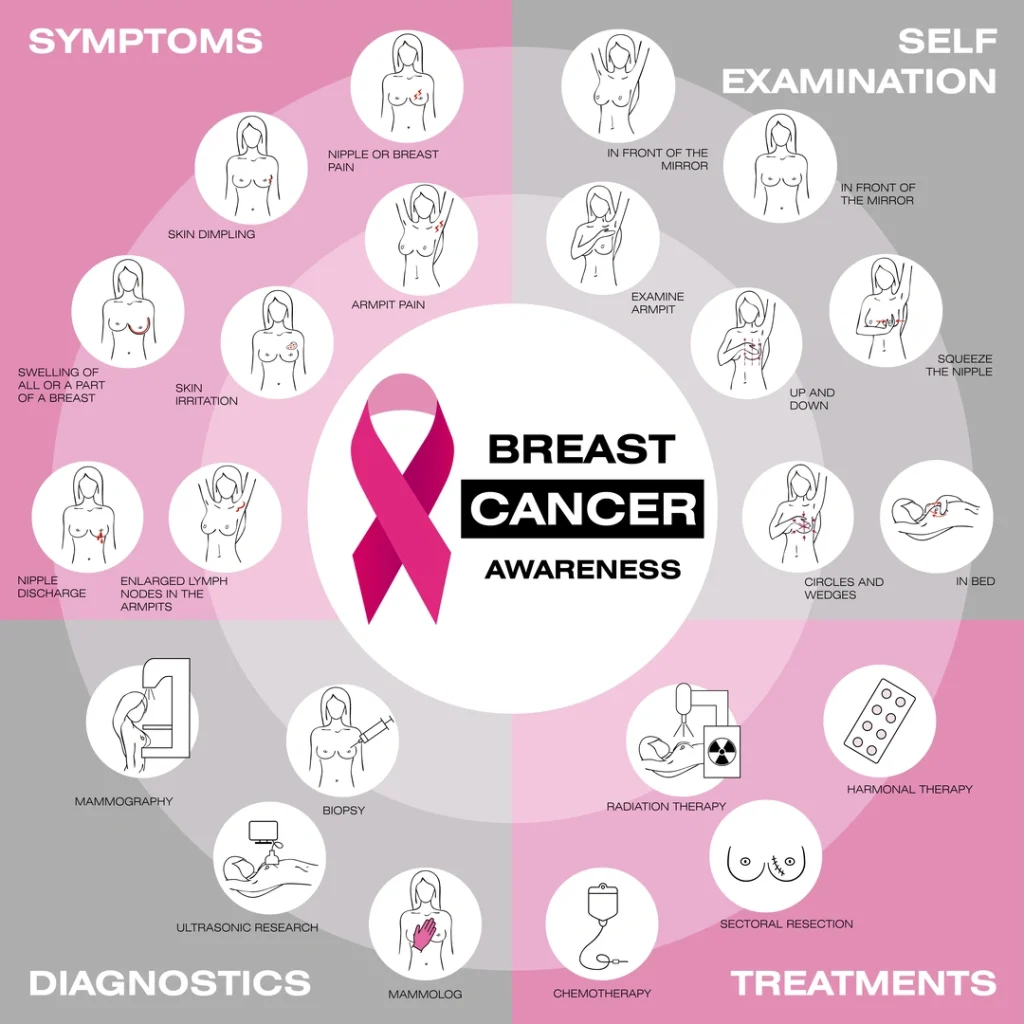
Breast cancer symptoms can manifest differently from one person to another, and some individuals may not experience any symptoms at all. It is crucial to seek medical attention immediately if you notice any signs of breast cancer. Early detection and treatment increase the likelihood of successful outcomes, so it is essential to be vigilant about any changes in your breasts. Regular self-examinations and mammograms can also help with early detection. If you are experiencing any of these symptoms or are concerned about your breast health, consult with a healthcare professional right away.
Breast cancer symptoms include:
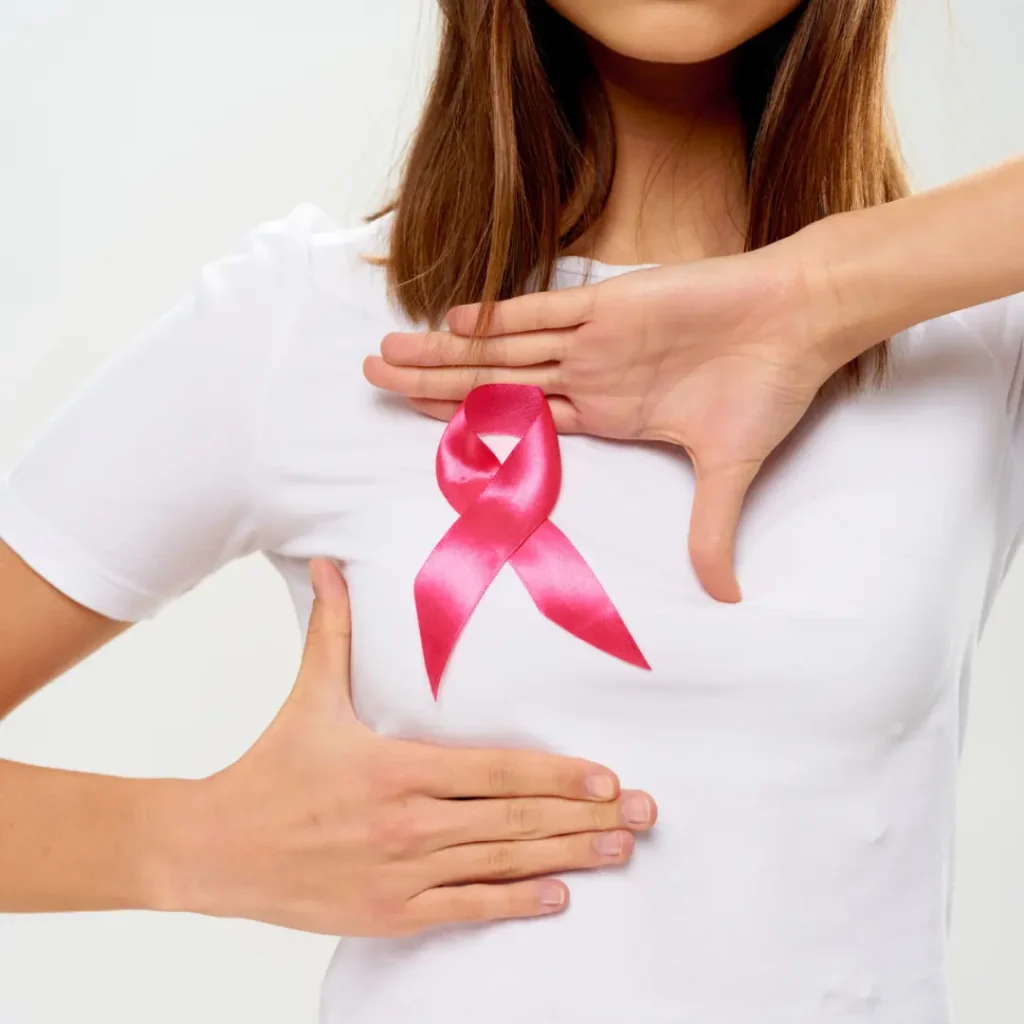
Your risk for breast cancer can increase due to a variety of factors. Knowing these risks and being proactive regarding your health concerns will help you in the long run. You and your physician can make a plan-of- action to take, because early detection is the best course of action to beat any cancer. Breast cancer risk factors include:
1) Aging: The risk for breast cancer increases with age. Most breast cancer is found in women 50 years or older.
2) Family history of breast or ovarian cancer: The risk for breast cancer is higher for those who have mothers, sisters, daughters, or other family members with breast or ovarian cancers.
3) Reproductive history: Early menstrual periods (before the age of 12) or starting menopause late (after the age of 55) exposes women to hormones longer, increasing the risk of breast cancer.
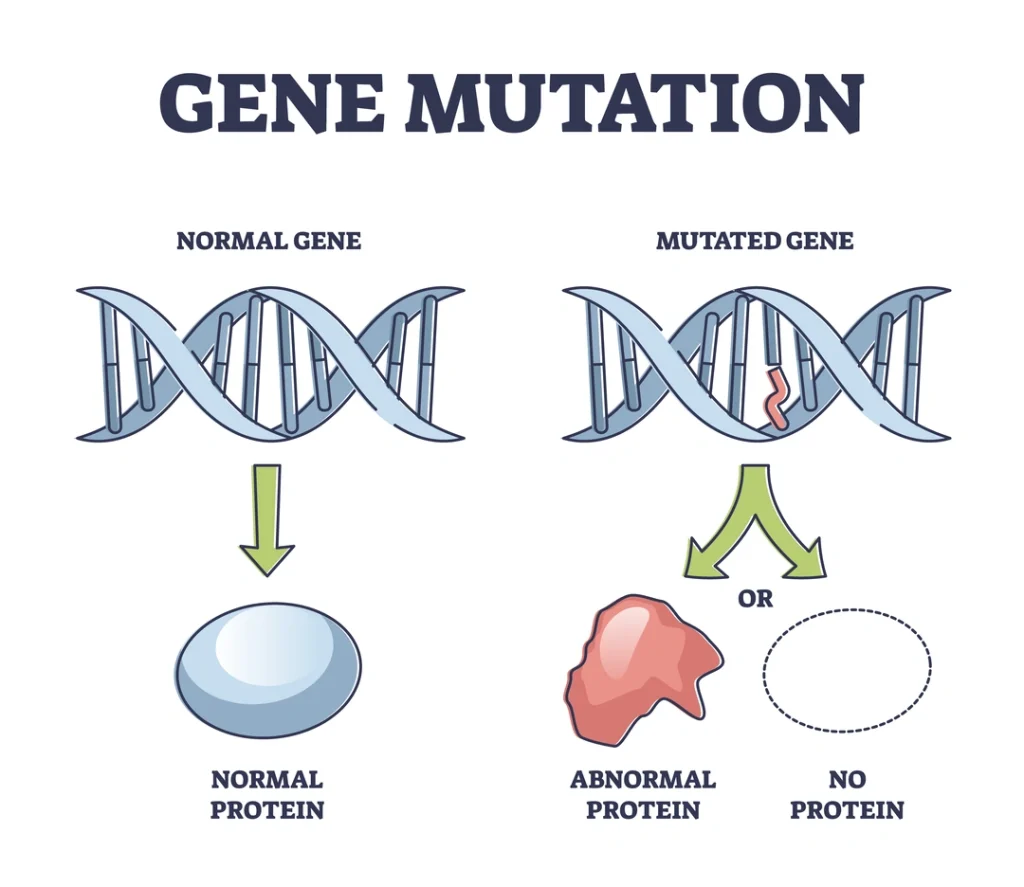
4) Genetic mutations: Women who have inherited changes (mutations) to certain genes, such as BRCA1 and BRCA2, have a higher risk of breast or ovarian cancer. If you do have mutations in BRCA genes and you are of Ashkenazi Jewish descent, you have an even higher risk for breast cancer.
5) Klinefelter syndrome: Klinefelter syndrome is an uncommon genetic disorder characterized by the presence of an additional X chromosome in males. This can result in elevated estrogen levels and reduced levels of androgens, which are responsible for the development and maintenance of male sexual characteristics.
6) Radiation therapy: Men who have undergone radiation therapy to the chest face an elevated risk of developing breast cancer.

7) Hormone therapy: Men who were treated with drugs containing estrogen, a hormone that aids in the development and maintenance of female sex characteristics, for prostate cancer in the past, have an elevated risk of developing breast cancer.
8) Liver disease: In men, the risk of breast cancer can be increased due to cirrhosis (scarring) of the liver, which can lead to lower androgen levels and higher estrogen levels.
9) Overweight: Men who are older and either overweight or obese are more susceptible to developing breast cancer.
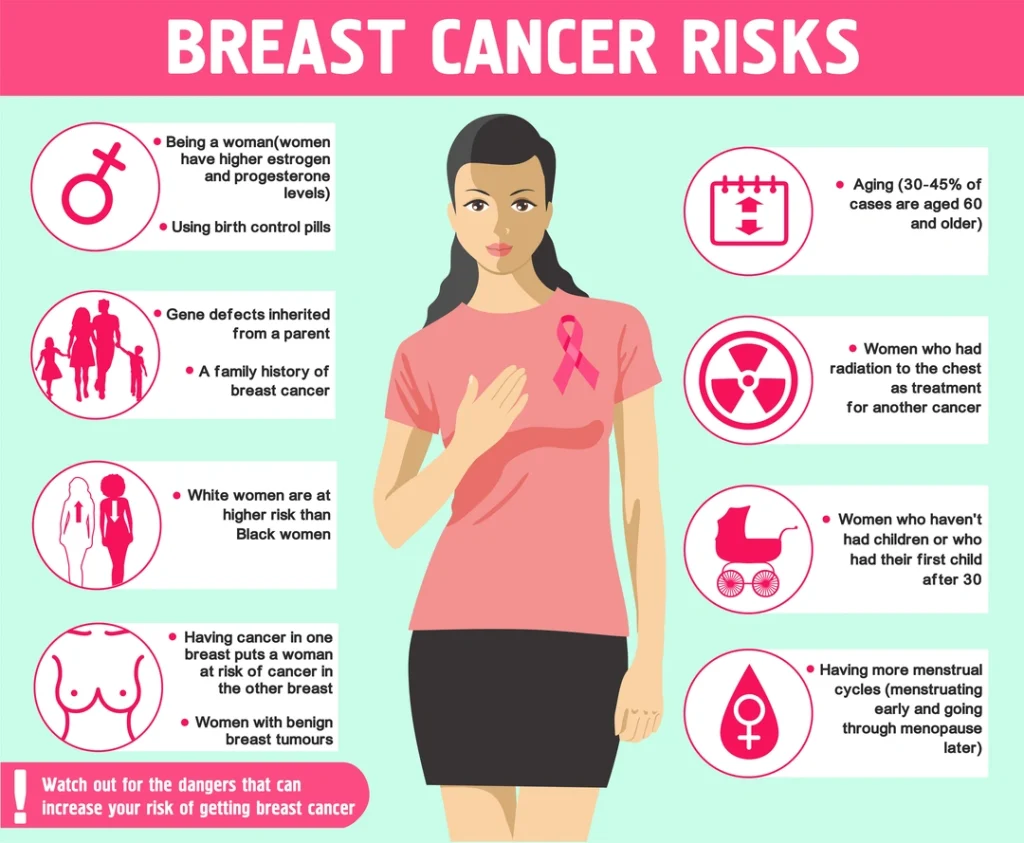
When it comes to reducing the risk of breast cancer, there are a few lifestyle changes that you can make in addition to consulting with your doctor about screenings. Maintaining a healthy weight through regular exercise and a balanced diet can lower the risk of breast cancer as well as other types of cancers. It is also recommended to limit exposure to environmental toxins and radiation. By incorporating these changes into your daily routine, you can take proactive steps towards reducing your risk of breast cancer.
Here is a small list to help reduce breast cancer risks:
If you are at a higher risk due to family history, consult your doctor on additional preventative measures that can be taken to reduce the risk of breast cancer.

Breast cancer treatment such as chemotherapy, radiation therapy, and medication are the most common treatments that can cause various side effects. The most common side effects can make food taste different, and patients may not enjoy eating the same foods they used to enjoy. Dysgeusia is a condition described as having sour, metallic or bitter taste in your mouth. It can also lead to a loss of appetite and weight loss, which can have negative impacts on the body’s healing process. Patients are advised to eat small, frequent meals throughout the day to ensure proper nutrition and avoid malnutrition. People with dysgeusia also tend to eat overly salty or sweet foods in an effort to mask the bad taste.
Cause of Metallic Taste
Breast cancer patients undergoing chemotherapy or radiation treatment may experience a metallic taste in their mouth due to damage to the salivary glands. Chemotherapy can also cause xerostomia, dry mouth, which leads to hypogeusia, a diminished sense of taste. Radiation therapy to the head or neck area can affect both taste buds and salivary glands. Surgery to the mouth and nose area may also impact these structures. Changes to the sense of smell may further affect how foods taste. While taste changes caused by radiation treatment usually start improving within 3 weeks to 2 months after treatment ends, it may take up to a year for the sense of taste to fully return if the salivary glands are harmed.

Breast cancer treatments such as chemotherapy and radiation therapy can cause dry mouth which reduces the amount of saliva one makes. This can lead to changes in taste and other issues like mouth infections, sore throat and tooth decay. To manage dry mouth, one can chew gum or suck on ice chips, hard candy or popsicles. It is important to take care of oral hygiene during cancer treatment to avoid further complications with taste, smell or feeling.
Dysgeusia, or an altered sense of taste, is a common side effect experienced by breast cancer patients undergoing chemotherapy. This can significantly impact their nutrition and overall health, making it crucial to maintain a healthy diet during treatment. Adequate nutrition plays a critical role in healing during chemotherapy, as it helps the body stay strong and respond well to treatment.
Cancer treatments, including chemotherapy, often lead to aversion to food or poor nutrition. Eating small portions of nutrient-rich foods can help provide the body with the nourishment it needs to stay strong. It is also essential to incorporate a variety of foods into your diet, including fruits, vegetables, whole grains, lean protein sources, and healthy fats. Furthermore, staying hydrated is crucial for maintaining optimal health during cancer treatment. Drinking enough water and other fluids can help prevent dehydration and alleviate some of the side effects associated with chemotherapy. Finally, consulting with a registered dietitian who specializes in oncology nutrition can be helpful in creating a personalized nutrition plan that meets your specific needs during and after breast cancer treatment.

High protein foods such as chicken, fish, tofu, cheese, eggs, nuts, beans, lentils and chickpeas are all great options for breast cancer patients to help maintain muscle strength and prevent weight loss. It’s also worth trying sweet marinades or experimenting with new foods that may be more palatable during treatment. It is important not to give up on eating well during this time. It is recommended to try new foods as tastes may change, and to prioritize good nutrition by stocking up on a variety of healthy foods.
Zinc supplementation has been found to be beneficial for breast cancer patients experiencing metallic taste. A study published in the Journal of Pain and Symptom Management found that breast cancer patients who received zinc sulfate supplements reported a reduction in the severity of their metallic taste symptoms. Zinc is an essential mineral that is required for many physiological processes in the body, including taste perception. Breast cancer treatments such as chemotherapy can cause alterations in taste perception, resulting in a metallic taste sensation. Zinc supplementation may help alleviate this symptom and improve overall quality of life for breast cancer patients undergoing treatment.
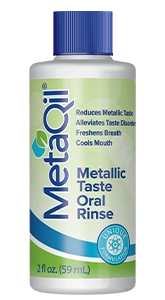
Rebecca Katz, a chef and author of “The Cancer-Fighting Kitchen,” recommends combatting the chemo-mouth effect through specialized cooking techniques and ingredients that enhance flavor. Another way you can help add to your daily routine is MetaQil Oral Rinse. MetaQil is the only OTC solution crafted to combat Dysgeusia. This specially formulated oral rinse is a game-changer, effectively and gently combating bitter, metallic, or abnormal tastes in your mouth. MetaQil leaves your mouth with a refreshing and cool sensation. Free from alcohol, sugar, and gluten, MetaQil is a safe and reliable choice for individuals seeking to combat their taste sensation and overall oral comfort.
Oncology treatment can lead to changes in taste perception and maybe a sore mouth. These changes are usually temporary and go away after the treatment ends, but this impairment can last for a long time in some cases. It is important for patients to maintain a healthy diet during and after treatment to ensure they are getting enough nutrients, including calcium. Fortified foods or supplements may be recommended by a physician or registered dietitian if necessary. A metallic taste in the mouth is a common side effect of breast cancer treatment, but it is often overlooked by healthcare professionals.

Dealing with cancer is undoubtedly one of life’s most challenging journeys, but there are ways to make this path a little easier and improve your quality of life:
Remember, coping with cancer is a highly personal journey, and what works best for one person may differ from another. Be patient with yourself and allow for moments of vulnerability. With the right support, self-care, and a positive mindset, you can enhance your quality of life while navigating the challenges of cancer. You are amazing, give yourself time to understand what you are dealing with and find the right steps to see this through.
Testimonial from the author and cancer warrior:
As someone who has battled cancer, I have learned valuable lessons along the way. Don’t forget that there are people here that want to help you become a survivor! Try to stay positive, even on your bad days and never forget that you are a warrior in my eyes!
MetaQil Oral Rinse is a first-of-its kind product that alleviates metallic taste symptoms, providing long-lasting comfort and relief.
MetaQil is the #1 over-the-counter solution for symptomatic relief of metallic taste. MetaQil’s scientifically designed formula alleviates metallic taste caused by chemotherapy, GERD, and a variety of medications. MetaQil gently cools the mouth and provides instant, long-lasting relief from metallic taste symptoms. It has a mild flavor and does not “sting” the mouth like an everyday mouthwash. Regular use of MetaQil can help patients return to healthy eating and adequate nutrient intake.
For best results, use approximately 5 ml (one teaspoon) of MetaQil®, rinse for 30 seconds, and spit out. MetaQil can be used on an as-needed basis. Use alone or after each time you brush your teeth.
Important: If you are pregnant or breastfeeding, please consult your physician before using MetaQil. Do not use MetaQil if you are taking any medications that are contraindicated with the product. Please consult with your physician if you have any concerns regarding the use of this product. Keep out of reach of children.